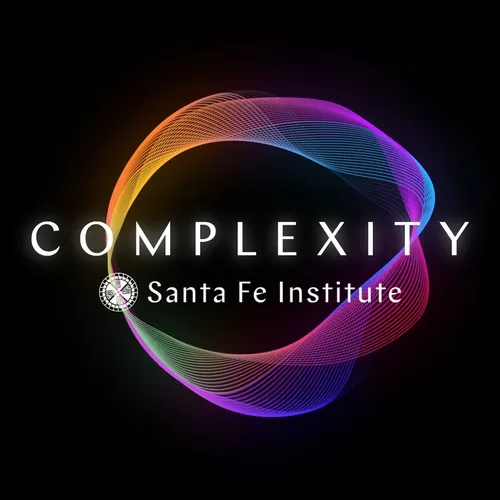
COMPLEXITY
The official podcast of the Santa Fe Institute. Subscribe now and be part of the exploration!
- Update frequency
- every 12 days
- Average duration
- 56 minutes
- Episodes
- 119
- Years Active
- 2019 - 2024

David B. Kinney on the Philosophy of Science
Science is often seen as a pure, objective discipline — as if it all rests neatly on cause and effect. As if the universe acknowledges a difference between ideal categories like “biology” and “physic…

Kirell Benzi on Data Art & The Future of Science Communication
Science has always been about improving human understanding of our universe…but scientists have not always prioritized accessibility of their hard-won results. The deeper research digs into specializ…

Chris Kempes on The Physical Constraints on Life & Evolution
Why is the internal structure of Bacteria so different from the architecture of a nucleated cell? Why do some kinds of organisms stay small, whereas others grow to enormous size? What evolutionary ch…

Andy Dobson on Disease Ecology & Conservation Strategy
Physics usually gets the credit for grand unifying theories and the search for universal laws…but looking past the arbitrary boundaries between the sciences, it’s just as true that ecological researc…

R. Maria del-Rio Chanona on Modeling Labor Markets & Tech Unemployment
Since the first Industrial Revolution, most people have responded in one of two ways to the threat of technological unemployment: either a general blanket fear that the machines are coming for us all…

W. Brian Arthur (Part 2) on The Future of The Economy
If the economy is better understood as an evolving system, an out-of-equilibrium ecology composed of agents that adapt to one another’s strategies, how does this change the way we think about our fut…

W. Brian Arthur (Part 1) on The History of Complexity Economics
From its beginnings as a discipline nearly 150 years ago, economics rested on assumptions that don’t hold up when studied in the present day. The notion that our economic systems are in equilibrium, …

Matthew Jackson on Social & Economic Networks
It may be a cliché, but it’s a timeless truth regardless: who you know matters. The connectedness of actors in a network tells us not just who wields the power in societies and markets, but also how …

Ray Monk on The Lives of Extraordinary Individuals: Wittgenstein, Russell, Oppenheimer
In this show’s first episode, David Krakauer explained how art and science live along an axis of explanatory depth: science strives to find the simplest adequate abstractions to explain the world we …

Melanie Moses on Metabolic Scaling in Biology & Computation
What is the difference between 100 kilograms of human being and 100 kilograms of algae? One answer to this question is the veins and arteries that carry nutrients throughout the human body, allowing …

Mirta Galesic on Social Learning & Decision-making
We live in a world so complicated and immense it challenges our comparably simple minds to even know which information we should use to make decisions. The human brain seems tuned to follow simple ru…

Olivia Judson on Major Energy Transitions in Evolutionary History
It’s easy to take modern Earth for granted — our breathable atmosphere, the delicately balanced ecosystems we depend on — but this world is nothing like the planet on which life first found its footh…

Rajiv Sethi on Stereotypes, Crime, and The Pursuit of Justice
Whether or not you think you hold them, stereotypes shape the lives of everyone on Earth. As human beings, we lack the ability to judge each situation as unique and different…and how we group novel e…

Jennifer Dunne on Reconstructing Ancient Food Webs
Looking back through time, the fossil record shows a remarkable diversity of forms, creatures unfamiliar to today’s Earth, suggesting ecosystems alien enough to challenge any sense of continuity. But…

Jennifer Dunne on Food Webs & ArchaeoEcology
For as long as humans have erected walls around our cities, we’ve considered culture separate from the encircling wilderness. This difference came to be expressed in our “man vs. nature” narratives, …

Luis Bettencourt on The Science of Cities
If you’re a human in this century, the odds are overwhelming that you are a city-dweller. These hubs of human cultural activity exert a powerful allure – and most people understand that this appeal i…

Sabine Hauert on Swarming Across Scales
If complex systems science had a mascot, it might be the murmuration. These enormous flocks of starlings darken skies across the northern hemisphere, performing intricate airborne maneuvers with no c…

The Origins of Life: David Krakauer, Sarah Maurer, and Chris Kempes at InterPlanetary Festival 2019
A few years after Charles Darwin published On the Origin of Species, upsetting centuries of certainty about the history of life, he wrote a now-famous letter to Joseph Dalton Hooker, British botanist…

David Krakauer on The Landscape of 21st Century Science
For 300 years, the dream of science was to understand the world by chopping it up into pieces. But boiling everything down to basic parts does not tell us about the way those parts behave together. P…